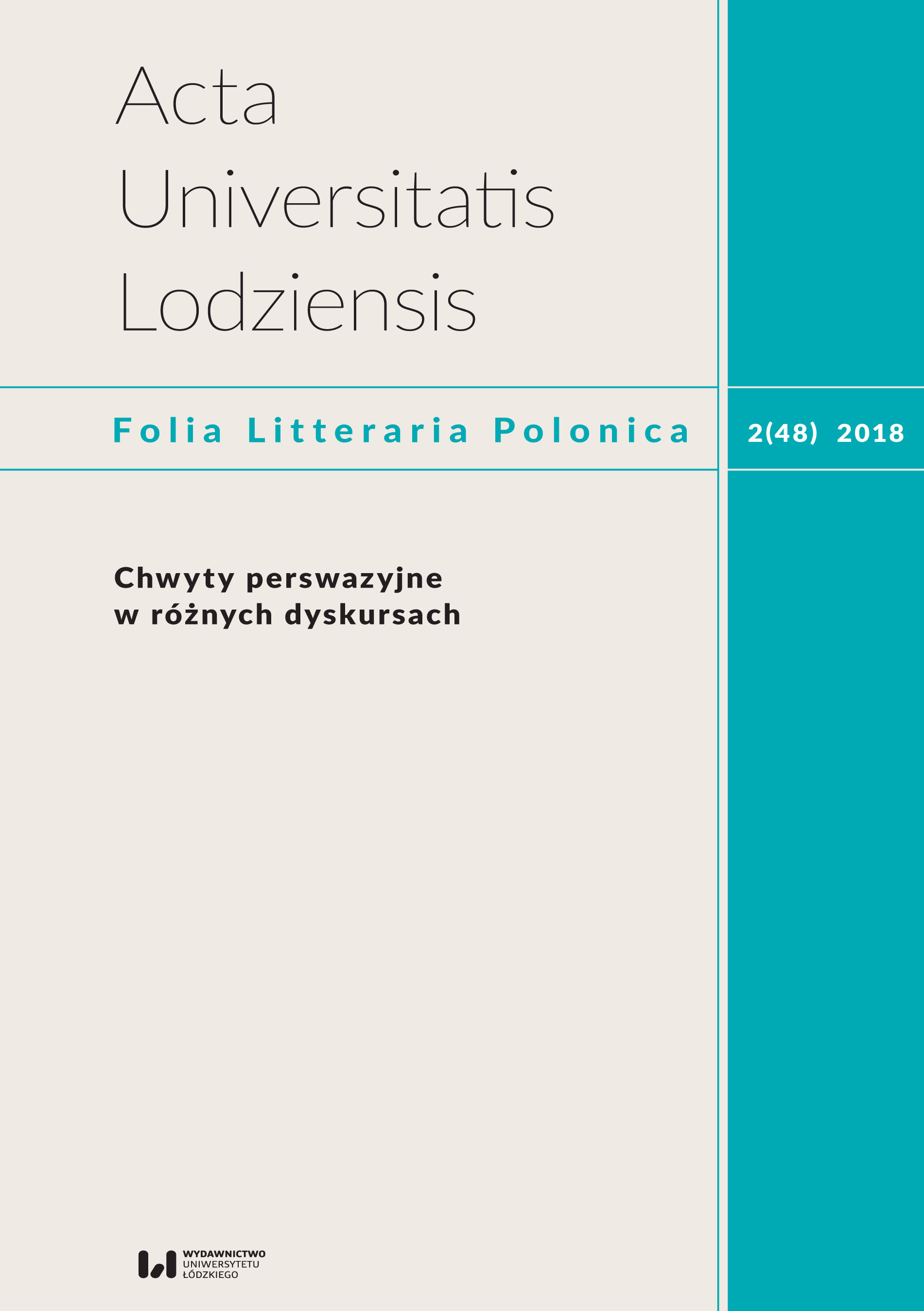Persuasive Imponderabilia: (Non)Cognitive Determinants of Argument Effectivity
DOI:
https://doi.org/10.18778/1505-9057.48.13Keywords:
attitude, axiology, argument, behavior, belief, communication, context, discussion, logic, mind, persuasion, representation, reality, schema, value, visionAbstract
In this text I discuss the cognitive and non-cognitive factors that determine the effectiveness of persuasion and argumentation which I dub “persuasive imponderabilia” due to the obvious difficulties with the operationalization of their impact in concrete, problem-solving situations. Concurrently, I also deal with the constitutive elements of persuasion examining their inherent qualities from a functional-pragmatic viewpoint. Specific attention is paid to: 1) The incompatibility of formal-logical models of argumentation with the reality of persuasive communication; 2) The need to include in the study of argumentation and persuasion, a subjective, axiologized vision of reality, as an important reference point in the functioning of “evidence”; 3) The heterogeneity of strategies for justifying convictions and beliefs which refer to various sources of cognition; and 4) The importance of philosophical queries concerning what is undetermined in human thinking and existence. These considerations are complemented by pointing to the logical improvability and unnecessariness of the very nature of the argumentation as well as to the role of a critical discussion in minimizing belief divergence in discursive interactions.
Downloads
References
Arystoteles, Retoryka. Retoryka dla Aleksandra. Poetyka, przekł. H. Podbielski, Warszawa 1988.
Google Scholar
Blair J.A., Johnson R.H., The Recent Development of Informal Logic, [w:] Informal Logic: The First International Symposium, red. J.A. Blair, R.H. Johnson, Inverness, CA 1980, s. 3–28.
Google Scholar
Blakemore D., Relevance and Linguistic Meaning: The Semantics and Pragmatics of Discourse Markers, Oxford 2002.
Google Scholar
Carston R., Thoughts and Utterances: The Pragmatics of Explicit Communication, Oxford 2002.
Google Scholar
Dębowska K., Model pragma-dialektyczny a rozumowanie abdukcyjne, „Studia Semiotyczne” 2010, nr 27, s. 217–236.
Google Scholar
Eemeren F.H. van, Grootendorst R., A Systematic Theory of Argumentation: The Pragma-Dialectical Approach, Cambridge 2004.
Google Scholar
Eemeren F.H. van, Grootendorst R., Argumentation, Communication, and Fallacies: A Pragma-Dialectical Perspective, Hillsdale, NJ 1992.
Google Scholar
Gawroński A., Wizja i argumentacja w filozofii. Od lektury Homera do teorii metatekstu, Kraków 2011.
Google Scholar
Givón T., Context as Other Minds: The Pragmatics of Sociality, Cognition and Communication, Amsterdam–Philadelphia 2005.
Google Scholar
Grice P., Studies in the Way of Words, Cambridge, MA 1989.
Google Scholar
Hołówka T., Błędy, spory, argumenty. Szkice z logiki stosowanej, Warszawa 1998.
Google Scholar
Hołówka T., Myślenie potoczne. Heterogeniczność zdrowego rozsądku, Warszawa 1996.
Google Scholar
Johnson R.H., Blair J.A., Informal Logic: Past and Present, [w:] New Essays in Informal Logic, red. R. Johnson, Newport News 1994, s. 32–51.
Google Scholar
Johnson R.H., Blair J.A., Informal Logic: The Past Five Years 1978–1983, „American Philosophical Quarterly” 1985, no. 22, s. 181–196.
Google Scholar
Johnson R.H., Blair J.A., The Current State of Informal Logic, „Informal Logic” 1987, no. 9, s. 147–151.
Google Scholar
Johnson R.H., Manifest Rationality: A Pragmatic Theory of Argument, Mahwah, NJ 2000.
Google Scholar
Lewiński P.H., Dialektyka – retoryka – komunikacja, [w:] Komunikatywizm w Polsce –wybrane zagadnienia z teorii i praktyki [seria: Poznawać. Tworzyć. Komunikować], red. G. Habrajska, Łódź 2011, s. 36–45.
Google Scholar
Lewiński P.H., Neosofistyka: argumentacja retoryczna w komunikacji potocznej, Wrocław 2012.
Google Scholar
Lewiński P.H., Od Arystotelesa do van Eemerena i Tindale’a. W poszukiwaniu źródeł współczesnej retoryki i dialektyki, [w:] Pragmatyka, retoryka, argumentacja. Obrazy języka i dyskursu w naukach humanistycznych, red. P. Stalmaszczyk, P. Cap, Kraków 2014, s. 43–61.
Google Scholar
Lewiński P.H., Retoryka a nauka, „Forum Artis Rhetoricae” 2015, nr 4, s. 27–47.
Google Scholar
Lichański J.Z., Badania nad retoryką w Polsce: wprowadzenie do bibliografii, „Forum Artis Rhetoricae” 2012, nr 1(28), s. 27–67.
Google Scholar
Lichański J.Z., Polska bibliografia retoryczna 2001–2014: uzupełnienia, część I, „Forum Artis Rhetoricae” 2014, nr 4(39), s. 68–78.
Google Scholar
Lichański J.Z., Research in Rhetoric in Poland (2001–2013): Introduction to Bibliography, „Forum Artis Rhetoricae” 2014, nr 1(36), s. 7–68.
Google Scholar
Lichański J.Z., Retoryka – argumentacja. Prolegomena do logiki rozumowań o przesłankach niepewnych, [w:] Pragmatyka, retoryka, argumentacja. Obrazy języka i dyskursu w naukach humanistycznych, red. P. Stalmaszczyk, P. Cap, Kraków 2014, s. 19–41.
Google Scholar
Modrzejewska E., Lógos, éthos, pathos w praktyce medialno-politycznej. Środki przekonywania w cytowanych wypowiedziach opozycji, „Forum Artis Rhetoricae” 2012, nr 2, s. 55–78.
Google Scholar
Pinto R.C., Argument, Inference and Dialectic: Collected Papers on Informal Logic, with an introduction by H.V. Hansen, Dordrecht–Boston 2001.
Google Scholar
Pragmatyka, retoryka, argumentacja. Obrazy języka i dyskursu w naukach humanistycznych, red. P. Stalmaszczyk, P. Cap, Kraków 2014.
Google Scholar
Sperber D., Wilson D., Relewancja. Komunikacja i poznanie, red. nauk. M. Jodłowiec, A. Piskorska, Kraków 2011.
Google Scholar
Szymanek K., „Onus probandi”, jego funkcje i uwarunkowania, „Folia Philosophica” 2006, nr 24, s. 242–255.
Google Scholar
Szymanek K., O teoriach spiskowych, „Folia Philosophica” 2012, nr 30, s. 259–281.
Google Scholar
Szymanek K., Sztuka argumentacji. Słownik terminologiczny, Warszawa 2001.
Google Scholar
Tokarz M., Argumentacja i perswazja, „Filozofia Nauki” 2003, nr 1(41), s. 7–41.
Google Scholar
Tokarz M., Argumentacja, perswazja, manipulacja, Gdańsk 2006.
Google Scholar
Walton D.N., Informal Logic: A Pragmatic Approach, Cambridge 2008.
Google Scholar
Ziomek J., Retoryka opisowa, Wrocław 1990.
Google Scholar
Downloads
Published
How to Cite
Issue
Section
License

This work is licensed under a Creative Commons Attribution-NonCommercial-NoDerivatives 4.0 International License.











